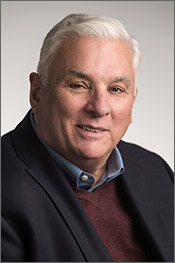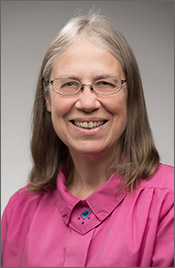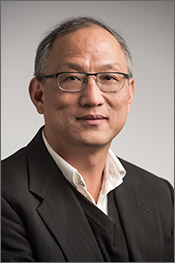News Release: Three New Fellows to Help Guide NREL Research
The Energy Department's National Renewable Energy Laboratory (NREL) recently named Richard DeBlasio, Sarah Kurtz and Suhuai Wei to its Research Fellows Council, the laboratory's top advisory council, comprised of internationally recognized NREL scientists and engineers.
Along with the nine current members of the Research Fellows Council, DeBlasio, Kurtz and Wei will advise NREL executive management on the strategic direction of science and technology research at the laboratory.

Richard (Dick) DeBlasio
An employee since 1978, DeBlasio is currently NREL's Chief Engineer for Renewable Electricity and End Use Systems as part of the Power Systems Engineering Center. DeBlasio also served for 10 years as the principal laboratory program manager for electricity research and development programs. In 1999, he initiated and managed the Distributed Power Program and conducted foundational distributed electric research on universal power electronics interoperability systems for electric grid interconnection, and from 1978 to 1999 as principal engineer, for photovoltaic (PV) module and systems performance and engineering research.
Based on his research at NREL, he initiated and led the IEEE 1547 grid interconnection and IEEE 2030 (smart grid) interoperability standards development. This monumental effort removed many of the technical barriers to using renewable energy sources to complement central power systems and has become the national standard for interconnection. As a life senior member of the IEEE (Institute of Electrical and Electronics Engineers) and member of the IEEE Standards Board, DeBlasio established a strong collaborative relationship with industry and stakeholders to validate and standardize technical requirements through collaborative research and testing.
"It's hard to imagine how the distributed PV industry would have evolved were it not for Dick's insight and foresight," NREL Associate Laboratory Director for Energy Systems Integration Bryan Hannegan said. "Without the consensus standards for interconnection and interoperability that he helped develop, PV and distributed energy resource systems would still be proprietary and unable to communicate with one another."
DeBlasio was awarded NREL's Francis Van Morris Award in 2004 for outstanding leadership and sustained dedication to the growth and development of the Photovoltaic Testing and Reliability, Distributed Power, and Distributed Energy and Electric Reliability programs. In 2010, he received the prestigious IEEE Charles Proteus Steinmetz Medal for "contributions to the standardization and global impact of distributed electric power system interconnection technology."
DeBlasio said he is "proud to have been selected as a Fellow," and of all that NREL has accomplished, "in support of the Energy Department and our national energy goals."

Sarah Kurtz
Kurtz is a Principal Scientist and Group Manager for the PV Reliability Test and Evaluation Group where she leads a team of 20 people working to quantify and predict the performance of photovoltaics (PV) in the field. She is a world-renowned expert in the fields of multijunction PV, concentrator PV and PV reliability.
Kurtz and NREL colleague Jerry Olson championed the early use of multi-junction solar cells by showing that a top cell of gallium indium phosphide (GaInP) and a bottom cell of gallium arsenide (GaAs) can capture and convert photons more efficiently into electricity than previous attempts at using other materials. Their breakthrough was embraced by NASA, which uses multi-junction solar cells based on this invention to power many space satellites, as well as the Mars rovers, Spirit and Opportunity.
Kurtz's work helped illuminate how to grow high-quality cells, how to measure multi-junction cells, and how their performance is affected under various spectra. More recently, she has looked at reliability issues when integrating multi-junction cells and other solar PV into larger systems.
She helped form the International PV Quality Assurance Task Force to develop comparative test standards for PV modules. In her newest role working toward PV standards development, NREL Principal Scientist Mowafak Al-Jassim noted, Kurtz "brought her strong materials science background to turn this field on its head and provided an unprecedented level of understanding of degradation and failure mechanisms in PV cells and modules."
Kurtz has received numerous individual and team awards, including the prestigious Cherry Award from IEEE and the Dan David Prize in the Future Time Dimension. She has authored more than 100 peer-reviewed publications and holds six patents.
"It's an honor to be selected as a Fellow at NREL and a real privilege to work with others at NREL, and at the Department of Energy, to further solar energy," Kurtz said.

Suhuai Wei
Wei joined NREL in 1985 and is now a Principal Scientist at the Materials Science Center. He is a world-renowned scientist in computational materials science, with expertise in semiconductors, PV, and other energy related materials.
During the last 29 years at NREL, he has made a number of key contributions to the current understanding of the structural and electronic properties of materials, including work on the effects of ordering on semiconductor alloys, the effects of d and f electrons in II-VI and magnetic semiconductors, the chemical trends of band offsets and deformation potentials in semiconductors, and the doping limit and control in wide-gap semiconductors. His work covers a wide range of fields including alloys, superlattices, PV materials, magnetic semiconductors, hybrid materials, nanomaterials, and wide band gap nitrides and oxides.
Wei was a group manager of Theoretical Materials Science at NREL for the last eight years.
"Suhuai has played a central role in helping NREL develop and maintain its leadership position in the theory of semiconductor materials," NREL Chemistry and Nanoscience Center Director Jao van de Lagemaat said. "He also has a well-deserved and outstanding reputation as a collaborator at NREL as illustrated by his joint publications with NREL staff on topics ranging from PV, hydrogen storage, energy storage to batteries."
He has published more than 380 peer-reviewed papers in leading scientific journals, including more than 90 papers in Physical Review Letters and Rapid Communications and 50 papers in Applied Physics Letters. His publications have been cited more than 27,000 times, earning him an h-index of 85. He is a Fellow of both the American Physical Society and The Materials Research Society.
"I am really honored to be selected as a Fellow at NREL and am very glad for the opportunities I've had to collaborate with talented colleagues and postdocs at NREL in the research for renewable energy applications," Wei said.
NREL is the U.S. Department of Energy's primary national laboratory for renewable energy and energy efficiency research and development. NREL is operated for the Energy Department by The Alliance for Sustainable Energy, LLC.
